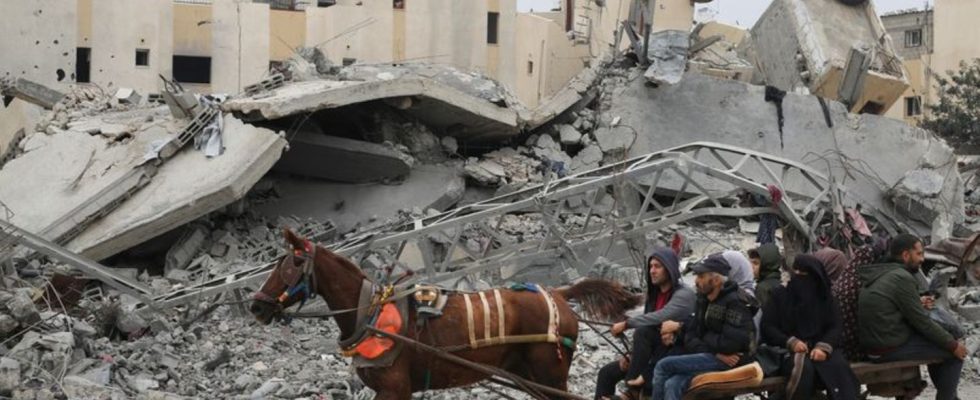Middle East
Gaza war: Is Israel violating international law?
Palestinians fleeing the Israeli ground offensive arrive in Rafah in the Gaza Strip. The suffering of civilians in the war is great. photo
© Hatem Ali/AP/dpa
The conditions in the Gaza Strip have become unbearable for many people. But Israel is not letting up in the fight against the Islamist Hamas. What is the legal situation?
At first glance, for many people the answer seems simple. The suffering of civilians in the Gaza Strip is so great that Israel is blatantly violating international humanitarian law with its bombing.
The United Nations (UN) also sees many signs that such an accusation is justified. At the same time, it is undisputed under international law that Israel has a right to self-defense after the bloody terrorist attack on October 7th organized by the Islamist Hamas. Whether the requirements of international law are adhered to depends on information that is currently difficult to obtain independently.
Is the bombing of the Gaza Strip with thousands of civilian casualties a violation of international humanitarian law?
The answer requires careful analysis. Currently, the assessment of the situation is based primarily on information from the warring parties. Fundamentally, international humanitarian law protects civilians and civilian objects. When taking military action, the military must, among other things, pay strict attention to the proportionality of the means. There is no formula as to when the proportionality between civilian casualties and the military objective achieved is violated. Trying to eliminate Hamas’ leadership may justify more civilian casualties than targeting ordinary soldiers.
How should we evaluate the fact that Israel says it is trying to limit the number of civilian victims through escape corridors and warnings?
There is an obligation under international law to warn civilians that a military attack is imminent. This can be done through text messages or leaflets or other means. If civilians do not heed the warning and the request to leave the area, this does not change their status. They will always remain civilians. The effectiveness of warnings and offers of escape and the question of whether they meet the requirements of international humanitarian law are currently the subject of controversy and discussion among international lawyers. A comprehensive assessment requires a detailed analysis of the specific circumstances and course of military operations.
How should the use of human protective shields be assessed?
The use of human shields is widely considered a serious violation of international humanitarian law. Using civilians to protect military objectives is a war crime. Condemnation of the use of human shields is widespread internationally.
Does absolute protection apply to hospitals or can civilian casualties be accepted if military opponents entrench themselves there?
The principle of absolute protection of medical facilities means that they must not be attacked – unless they are used for hostile actions. A hospital from which fighters are shooting or firing rockets can become a military target. If the enemy entrenches himself in or under the building, it should still not be attacked, says Graz international law expert Yvonne Karimi-Schmidt. The protection of civilians and civilian facilities was a priority and parties to the conflict were expected to do everything possible to protect medical facilities and their personnel.
What is the current Israeli perspective?
Former Attorney General Avichai Mandelblit points out that when it comes to the question of proportionality of attacks, each attack is considered individually, not the total number of civilians killed. He speaks of an “asymmetric war” with Hamas. As a democratic state, Israel is committed to the rules of war, while Hamas violates them, for example by using civilians as shields or firing rockets at Israeli population centers. Legal experts who can make statements about proportionality are always involved in decisions about Israeli attacks. But the final decision is made by a commander.
What about the delivery of relief supplies?
Whether as an occupying power or as a warring party, Israel must in any case allow the delivery of humanitarian aid such as food, water and medicine. However, such measures do not replace basic protection and respect for human rights. Israel’s agreement to deliver aid is a positive step towards meeting the humanitarian needs of the population in the Gaza Strip, said Karimi-Schmidt.
What legal or political dangers does Israel face?
Mandelblit emphasizes that killing civilians is not in Israel’s interest; on the contrary, it plays into the hands of Hamas. Hamas therefore prefers a war in densely populated residential areas to a conflict in open areas. “If you kill civilians, attack hospitals and mosques that enjoy special protection, you have to prove that they were military targets, if not, you lose the war, you lose in the media and on the legal front,” he says. If the legitimacy of military action is questioned, “the world will stop you.”

